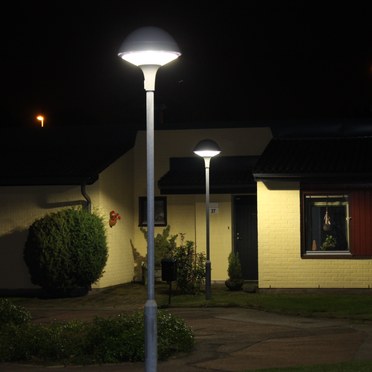Västra Fäladen, Sweden
- Lamp efficacy
Lamp efficacy
Ensuring the lamp efficiently converts electricity into light (lm/W).
- Ballast classification
Ballast classification
Controlling the electricity supply to the lamp (Energy Efficiency Index).
- Luminaire distribution
Luminaire distribution
Controlling light emission using optics which bend and shape the light to the correct location.
- System efficacy
System efficacy
Combining optical and thermal control within the luminaire (luminaire lm/W).
- Presence/absence detection
Presence/absence detection
Providing lighting only when it’s needed.
- Daylight detection
Daylight detection
Reducing waste light during daylight hours.
- Constant illuminance
Constant illuminance
Producing the correct lighting levels for the duration of the maintenance period.
- Task-scene setting
Task-scene setting
Allowing the user to set scenes and adapt the lighting to different tasks.
- Timed off
Timed off
Automatic cut-off to turn all lights off during unoccupied hours.
- Task lighting
Task lighting
Lighting task areas with the correct amount of light.
- Zoning of lighting
Zoning of lighting
Zoning lighting in accordance to occupancy patterns or window location.
- Maintenance schedule
Maintenance schedule
Tailoring maintenance schedules in accordance to product age, performance and environment.
- Waste light
Waste light
Eliminating waste light which does not hit the intended target.
- Reflectance
Reflectance
Taking advantage of light which is reflected from the surface within the space.
- Visible smart metering
Visible smart metering
Enabling results of actions to be quickly seen as increased or decreased energy use to encourage responsible energy consumption.
Thorn Sweden slashes energy costs for housing association with 80% saving
AB Landskronahem, which owns and manages about 4,000 apartments in the Swedish city of Landskrona, has strict environmental standards. To help keep them up, Thorn 40W exterior LED lanterns have been installed throughout the residential district of Västra Fäladen, from pedestrian routes and cycle paths to playgrounds and parking spaces.
A 3.36kW LED system of 80 Plurio and Avenue F units has superseded, on a point for point basis, an 11.2kW mercury vapour installation while still increasing illumination levels. As the lanterns employ power reduction control gear total operating load is just 2.16kW – an overall saving in running costs of 80%.
Another achievement was the reduction of glare. This was obtained by using two optical techniques – reflectors (Plurio LED) and prisms (Avenue F LED) – to deliver a mixture of asymmetric and symmetric light distributions.
The new lighting has improved living conditions with residents reporting positive experiences and feelings of greater security and safety.
The fittings were supplied pre-wired with 4m of cable to speed up installation.

